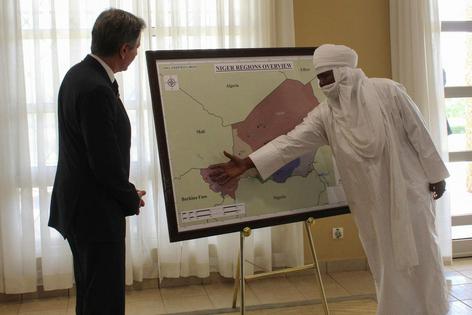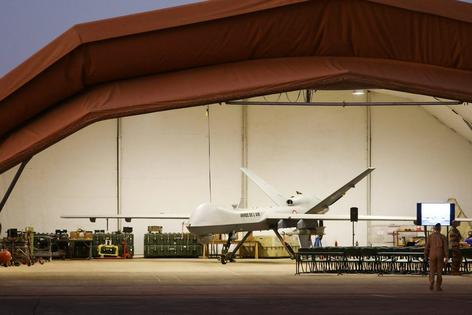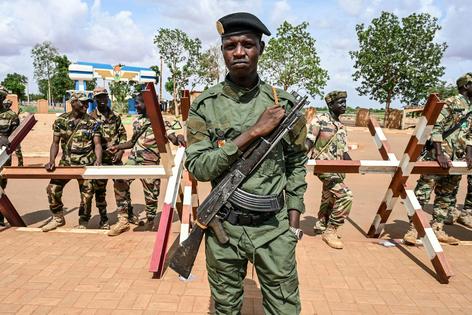The US is losing access to its bases in Niger − here’s why that’s a big deal
Published in Political News
The United States was forced to stop its military operations in March 2024 in Niger – a landlocked, western African country in the Sahara desert. Niger may not immediately seem like a key ally for the U.S., but it served as a crucial staging ground for the U.S. military to carry out work and respond to terrorism in the region.
U.S. representatives are currently trying to negotiate a deal to maintain some sort of military presence in Niger. But, for now, Niger’s new ruling junta has declared that the U.S. military presence is a violation of Niger’s constitution. The fate of the U.S.‘ presence, including two military drone bases, remains uncertain.
In July 2023, Niger’s military successfully conducted a coup d'état and overthrew the democratically elected government. Military leaders arrested President Mohamed Bazoum and announced an end to the constitution and the government. The coup plotters set up their own government, a military junta called the National Council for the Safeguard of the Homeland, to run the country – even as the president still refuses to resign.
Niger is a former French colony and up until recently was home to 1,500 French troops, who mostly all left by December 2023. When the military junta expelled the French troops, it initially allowed the U.S. to continue to operate the base. Yet in March 2024, it ordered the U.S. to leave.
Though approximately 1,000 U.S. troops remain in Niger, the prospects for the U.S. maintaining its current presence and reactivating the drone bases do not look promising. Aside from the military junta, thousands of Nigeriens have participated in large-scale protests calling for the U.S. military to leave.
As a further complication, Russian military personnel arrived in Niger in April 2024 to train Nigerien forces. They delivered military equipment and stated that they planned to build an air defense system in Niger. This deployment is part of the increased military cooperation with Russia that Niger is pursuing.
As experts in U.S. military deployments, we think it is clear that the loss of these bases creates problems for U.S. regional interests in Africa and cedes ground to Russia and China. This places the U.S. in a disadvantageous position for creating political influence in Africa.
The U.S. has a military presence in several African countries.
In Niger, the U.S. has had two military bases, called Air Base 101 and Air Base 201, and first started drone operations in 2013.
While Niger is one of the poorest countries in the world, its geographic location and natural resources have increased its importance to global powers. Specifically, Niger’s location gives the U.S. ability to engage in counterterrorism throughout much of West Africa.
There has been increased political insurgency and violence in this region of Africa in the past several years. Drones from Air Base 201 have increasingly monitored and collected intelligence on the Islamic State and al-Qaida. The U.S. monitors activity in the Lake Chad Basin that includes Niger’s neighboring countries of Cameroon, Chad and Nigeria.
Since Niger’s military coup, the country has become increasingly isolated from others. The French and U.S. governments have reduced aid to Niger, and the European Union and Nigeria have all instituted economic sanctions.
In response, Niger’s ruling junta has strengthened military cooperation with Russia and Iran.
If U.S. forces are removed from Niger entirely, this may also provide opportunities for China to increase its influence there. In recent years, China has been one of Niger’s top trading partners. In 2022, China took in approximately 9% of Niger’s exports and accounted for 22% of Niger’s imports.
The U.S. accounts for a relatively small share of Niger’s total trade.
The U.S., China and Russia have all created a growing military footprint in Africa over the past two decades.
Before 2001, U.S. aid to Africa was focused on goals such as eradicating HIV/AIDS and creating more educational opportunities for children.
Following the Sept. 11, 2001, attacks in the U.S. and the subsequent war on terrorism, the U.S. continued to carry out health and other work in Africa but also increased its military footprint there. President George W. Bush’s administration tried to eradicate al-Qaida affiliates and other extremist movements in Africa and elsewhere. African countries that were the targets of al-Qaida terrorism also saw an increase in the proportion of U.S. military aid they received.
In 2007, the U.S. Department of Defense unified its work in Africa by creating a new command called Africa Command, or AFRICOM. Under AFRICOM, the U.S. military has trained, advised and assisted the militaries of other African countries and has also tried to combat militant groups such as Boko Haram.
China established its first permanent foreign military base in Djibouti in 2017. It is now reportedly trying to get another in Equatorial Guinea. Beyond military bases, China has poured billions of dollars into economic development across Africa through its Belt and Road Initiative, which aims to develop new trade routes for China.
The U.S. has also worked with China to fight piracy off the Horn of Africa and promote stability in international shipping lanes.
Russia, meanwhile, had used the Wagner Group, a state-funded private military organization, to provide military assistance and negotiate new economic deals with African leaders. After a failed Wagner Group mutiny and the death of its leader, Yevgeny Prigozhin, the Wagner Group in Africa was rebranded as Africa Corps and continues much of this work in Africa.
These countries’ interest in building new military bases in Africa is rooted in their desire to promote their interests and secure access to commercial and security resources.
The U.S. is now looking for alternatives to its lost drone bases in Niger, but there are few options in the region that are both allies with the U.S. and do not have a military government. While the U.S. has historically worked with and can influence nations where the military also runs the government, in the post-Cold War period the U.S. generally aligns itself with democratic countries.
In addition, as U.S. rivals such as China and Russia gain influence in the region, it may become more expensive for the U.S. to set up new military bases in Africa. Research shows that when host states can choose between major powers to cooperate with, it requires more economic incentives to gain their favor. This means that it is not clear to what extent the U.S. can maintain a presence in western and central Africa.
This article is republished from The Conversation, a nonprofit, independent news organization bringing you facts and analysis to help you make sense of our complex world.
Read more:
Niger coup: Military takeover is a setback for democracy and US interests in West Africa
US response to Gabon and Niger coups suggests need for a new West Africa policy in Washington
Michael A. Allen has previously received funding from the Department of Defense's Minerva Initiative.
Carla Martinez Machain has previously received funding from the Department of Defense's Minerva Initiative.
Michael E. Flynn has previously received funding from the Minerva Research Initiative, the Department of Defense, and the Army Research Office. The views expressed here are the authors' only and do not represent the views of any outside funder.


































































Comments